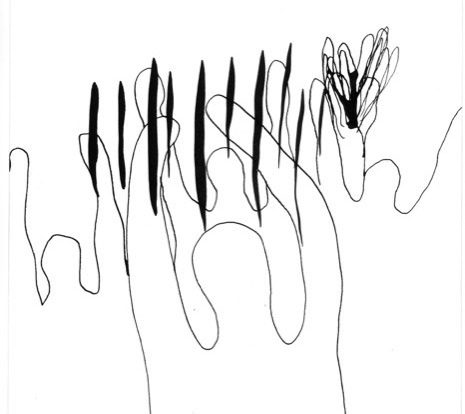In 2005, I went to Palestine for three weeks with my parents, my wife and our daughter, aged two. We were invited to carry out workshops with young artists and kids. A mural was painted on the wall of a playground in a camp next to Qalendia check point. We made several friends and knew some of our roots were now planted in that earth. During that time and after I wrote a long poem called Destinez moi la Palestine. Later on it was published in an Arabic/French version and printed in Jerusalem. The friends who made that publication possible kept it as a surprise and one day I unexpectedly received a copy of the book. How grateful I was.
In 2010, I was invited to do a series of readings from that book in different cities in the West Bank. Again, in the face of what I was witnessing I had no other choice than to write. This gave birth to these poems. In French they were published by Editions Samizdat under the title Hommes sous hommes: Écrits de la Palestine occupée. My father then translated them into English and a few were published in Modern Poetry in Translation and one in the Guardian.
Écrits de la Palestine occupée
Notes from occupied Palestine
seulement un chemin brûlant sous le soleil
Le temps passe sans arrêt et sans issue
sur le monde que séparent deux instants
Le vent et la pluie érodent les parois des rochers
semblables à des crânes endormis dans la terre
Il y a une silhouette en contre-jour
debout sur le seuil entre ici et la mort
but a scorched road under the sun
Time persists with no pause nor an exit
over a world split between now and now
The wind and rain strip the rocks
asleep in the earth like skulls
A silhouette stands against the light
in a doorway between death and here
03.03.10
Naplouse
Au flanc des montagnes couchées
serpentent les rues de la ville
comme au-dedans d’un animal
Noires de la graisse des mouteurs
les parois des rouchers prolongent
les façades profondes des foyers
Des visages percent les murs
de leurs yeux de martyrs
ouverts entre deux mondes
Des enfants sont chaque soir
les leaders aux pieds fragiles
d’une révolution qui s’endort
dans des bras trop petits
Les mères forment les cortèges
des marriages de leurs filles
et de leurs fils à enterrer
Dans la nuit tombée
sur des ombres en fuite
une patrouille fait feu
Des bouches ouvertes soufflent
un silence entre les mots
étendus pierres après pierres
03.03.10
Naplouse
Streets twist and turn
on the mountain flanks
as do animal intestines
Black with petrol fumes
the rock faces merge
with the faces of homes
Faces glance on the walls
with the eyes of martyrs
open between two worlds
Each evening kids
with wobbly knees
whisper to the revolution
cradled in their thin arms
Mothers join the cortege
for daughters’ weddings
and sons’ obsequies
In the deep night
a patrol fires on
shadows in flight
From an open mouth comes
the silence between words
laid out like stones

04.03.10
Dheisheh
D’étage en étage
la file des réfugiés
s’allonge contre le ciel
Les enfants du camp
l’écume à la bouche
écoutent les grand-pères
Sur le béton des ruelles
les pas se souviennent
des chemins du village
Chaque langue conserve
comme le lait maternel
le goût de l’eau salée
Les souvenirs dessinent
la forme des coquillages
à l’intérieur des oreilles
Les fenêtres s’ouvrent
sur des fenêtres ouvertes
sur un phare en exil
Nul membre n’abandonne
aucun autre membre
arraché à cette terre
De foyer en foyer
les vagues de la Nakba
se brisent sur les cloisons
04.03.10
Dheisheh
Storey after storey
refugees pile up
beneath the sky
Kids from the camp
hear their granddads
following the tide
Along asphalt alleys
footsteps recall
paths of the village
Every tongue still tastes
like a mother’s milk
the sea’s salt water
Memories make
the form of seashells
visible in the ears
Windows give on to
other windows facing
a vanished lighthouse
Here no limb
abandons another
torn from its home
In lodging after lodging
waves from the Nakba
break against party walls

09.03.10
Modiin Highway
Nuit chaude et indifférente d’un printemps
étouffant continuelllement ses promesses
De part et d’autre de la voie rapide réservée
la terre gards en elle les morts immobiles
Sous les toits aux tonneaux de plastique noir
dorment les familles oubliées de l’après-guerre
Sur les collines conquises aux noms des victimes
des lumières jaunes coupent le monde en deux
Les champs de tirs attendant les tirs des soldats
et l’herbe se couche sous le ventre des chiens
Des fosses de chantiers s’ouvrent face au ciel
de jeunes ouvriers descendent les tiges de fer
Aucune machine ne construit d’autres machines
capables de retenir les aspirations des hommes
09.03.10
Modiin Highway
Warm night of an indifferent spring
stifling each of its awaited promises
On either side of the reserved fast road
earth embraces the unmoving dead
Below the black plastic water tanks
sleep families forgotten since 1948
On the heights stolen in the name of victims
strident yellow lights cut the world in two
Shooting ranges wait for their firing soldiers
and the grass is flattened by lying wild dogs
Into the excavations open to the sky
young workers lower iron bars
No machine can produce other machines
that can hold back human aspiration
Yves Berger, Hommes sous hommes: Écrits de la Palestine occupée was published by Editions Samizdat, Geneva in 2016.
Cover image via Palestine Open Maps
All drawings by Yves Berger
English translations by John Berger
We have published further extracts from Hommes sous Hommes by Yves Berger here.
This is part of ROOT MAPPING, a section of The Learned Pig devoted to exploring which maps might help us live with a clear sense of where we are. ROOT MAPPING is conceived and edited by Melanie Viets.


